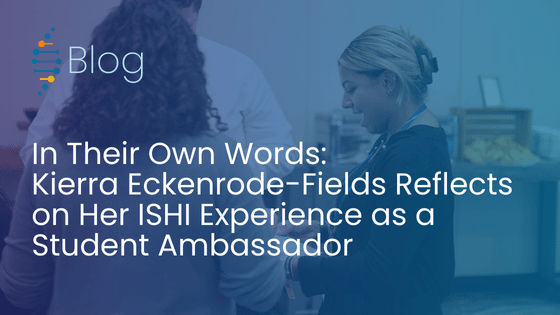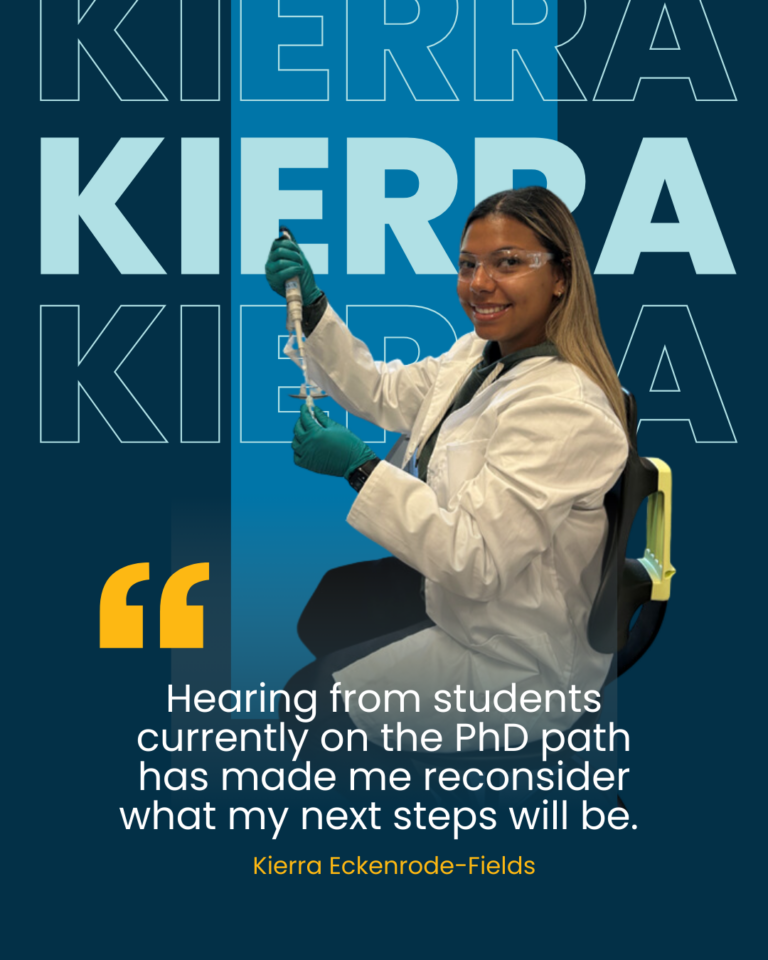Are you a passionate student pursuing a degree in forensic science, eager to dive into the world of cutting-edge research and groundbreaking advancements? Look no further! The ISHI Student Ambassador Program is your exclusive gateway to unparalleled opportunities at the International Symposium on Human Identification (ISHI) conference. The application window opens on February 3, 2025.
Every year, the International Symposium on Human Identification (ISHI) brings together forensic professionals from around the world to share their latest research and connect with peers. But some of the most inspiring moments come from the students—those just starting their journey into the world of forensic science. As part of the ISHI Student Ambassador Program, young scientists are given the opportunity to present their work, engage with leaders in the field, and gain invaluable insights into the profession. In this blog, we sit down with Kierra Eckenrode-Fields, a student at Towson University and one of this year’s ambassadors to hear about her experiences at ISHI. From connecting with peers to exploring new research methodologies, these reflections offer a unique glimpse into the future of forensic science.

Your passion for forensic science was sparked by the character of Barry Allen from The Flash. During the ISHI keynote, Anna Barbaro discussed how true crime media has inspired a new generation of forensic scientists. How did hearing from experts like Dr. Barbaro and others during the keynote reinforce or reshape your view of the field, and did it align with your own journey into forensic science?
I really enjoyed hearing from all of the speakers throughout the keynote. Listening to everyone share the direct impact of the work that they do only made me more sound in my decision to work in this field. It was such an amazing experience to hear James Mayer announce to his colleagues that he had just been notified their work on a pair of wrongful convictions had resulted in exonerations. To hear that news and see everyone’s reaction in real time is something I will never forget. It seemed as though many people had different journeys that led them to forensic science. Some speakers got into the field years into their careers and others, like Dr. Barbaro, grew up in the forensics world. Although many of us found our way to forensics on different paths, I think it’s important we appreciate those differences and how they all led us to the same place.
As someone looking to become a forensic DNA analyst and eventually work in forensic investigative genetic genealogy (FIGG), how did ISHI enhance your understanding of how FIGG is being implemented in forensic labs today? Were there any presentations or conversations that gave you new insights into the potential challenges or advancements in this area?
The first day of the conference I attended a workshop that covered considerations of implementing FIGG into publicly accredited laboratories. Throughout this workshop I learned just how challenging implementation is. The kits and instrumentation are very expensive with the NovaSeq 6000 costing around $1,000,000. I learned about the challenges of storing whole genome data and how HIPPA is a big concern. It was interesting to hear about the different advancements that have been made in this area. For example, when speaking on the validation work done for Kintelligence, Amy Smuts shared that 250pg samples gave readouts above the interpretation threshold despite being lower than the recommended input of 1ng. While there are many factors that go into FIGG, the work that is able to be done with this technology is remarkable. I am hopeful that one day more labs will have access to implement this method as it would help solve thousands of cases.

Being an undergraduate student, how did it feel to meet and network with peers who were further along in their academic careers, such as master’s or Ph.D. students? Did you gain any valuable insights from them about navigating the next steps in your own educational and career journey?
As a graduate student getting ready to finish my degree, I really enjoyed getting to spend time with Ph. D. students as it is not something I typically do. I loved hearing about their backgrounds and how they ended up where they are now. They advised the importance of ensuring you have a good support system and developing efficient time management strategies. I was also eager to hear about their research projects as well as learn more about their programs. I have often debated the idea of continuing to further my education by obtaining a Ph.D. Hearing from students currently on that path has made me reconsider what my next steps will be after graduating with my master’s degree.
At ISHI, you presented research on the effects of water-based lubricants on DNA collected from SAFE/SANE kits. What kind of feedback did you receive, and how did discussions with experts in DNA analysis help you refine your research approach or open up new areas of exploration?
This was my first time presenting a research project to experts in the field so I was unsure what to expect and nervous about what they would have to say. I was pleasantly surprised with the genuine interest people had in this project and how eager some were to share advice. I received helpful feedback on how to improve my results and potential methods I could use to further examine different aspects of my project. Ideas were mentioned that I hadn’t yet thought of, and I am hoping to explore them before graduating. I enjoyed hearing the perspectives of people coming from different areas in the field and will be implementing as much of their advice as possible into my project.
As a student ambassador, you had a unique opportunity to engage with experts and peers in a way that shaped your future career path. What would you say to other students considering applying for the Student Ambassador Program? How has the experience benefited you personally and professionally?
My biggest piece of advice for students thinking of applying to the Student Ambassador Program is to have confidence in yourself and in your work. When applying for this program I didn’t think I had a chance of being chosen as an ambassador. This experience has allowed me to put more trust in myself and my capabilities. ISHI is an amazing opportunity for students to connect with professionals of all different disciplines in the forensics field. I enjoyed my time at the conference along with the relationships I was able to develop and hope I can attend again in the future.

